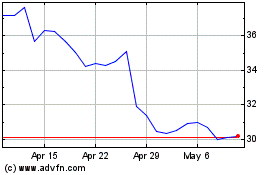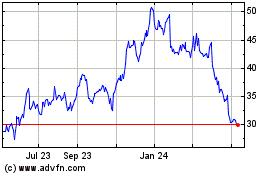AMD Hits a Snag Over Patch for Chip Flaw
January 09 2018 - 3:33PM
Dow Jones News
By Robert McMillan and Ted Greenwald
Days after Advanced Micro Devices Inc. suggested its chips were
largely unaffected by significant vulnerabilities found in a
variety of processors, the rival to Intel Corp. has run into
trouble.
Microsoft Corp. on Tuesday said some customers found their
AMD-powered computers were unusable after applying the latest
security patches for the Windows operating system.
On an online support page, Microsoft said it would "temporarily
pause" sending updates to some devices running AMD processors.
After investigating, the software giant said it found "some AMD
chipsets do not conform to the documentation previously provided to
Microsoft."
Intel's shares sank in the two days after the chip
vulnerabilities were disclosed last week, while AMD shares are up
more than 15% since Jan. 2, the day before news of the security
flaws was widely disclosed. An AMD spokesman at the time said the
flaws posed a "near-zero risk" to its processors. Its shares were
down 3.5% in afternoon trading Tuesday.
The patch issue affects "a small subset of older processors that
were sold prior to 2009," an AMD spokesman said Tuesday.
AMD and security researchers say the company's chips aren't
vulnerable to the most easily exploitable -- but most easily
patched -- variant of the security flaws, known as Meltdown.
Instead, the problem that is being patched by Microsoft concerns
a variant of another flaw, known as Spectre. It is likely to be an
increasingly important security problem in the months to come, as
researchers learn more about the issue, said Paul Kocher, an
independent security researcher, who was among those who discovered
the Spectre vulnerabilities.
"Once the Meltdown patches are installed, I don't see any
significant security difference between Intel and AMD on these
issues," he said.
AMD should have done a better job documenting how software
makers should develop patches for the chip maker's hardware and
more clearly explained the security issues associated with their
products, Mr. Kocher said. Rivals Intel and ARM Holdings have
offered much more detailed documentation of these security issues,
he said.
"Microsoft has access to our processor architecture
documentation, which is essentially what is needed, and we have
been engaged regularly in engineering meetings to assist since this
was disclosed," the AMD spokesman said.
Glitches are possible any time a software update is deployed.
"It wouldn't be the first time a Windows update had an issue," said
Patrick Moorhead, an analyst with Moor Insights & Strategy.
"But it's obviously not a positive thing."
Write to Robert McMillan at Robert.Mcmillan@wsj.com and Ted
Greenwald at Ted.Greenwald@wsj.com
(END) Dow Jones Newswires
January 09, 2018 15:18 ET (20:18 GMT)
Copyright (c) 2018 Dow Jones & Company, Inc.
Intel (NASDAQ:INTC)
Historical Stock Chart
From Mar 2024 to Apr 2024

Intel (NASDAQ:INTC)
Historical Stock Chart
From Apr 2023 to Apr 2024
